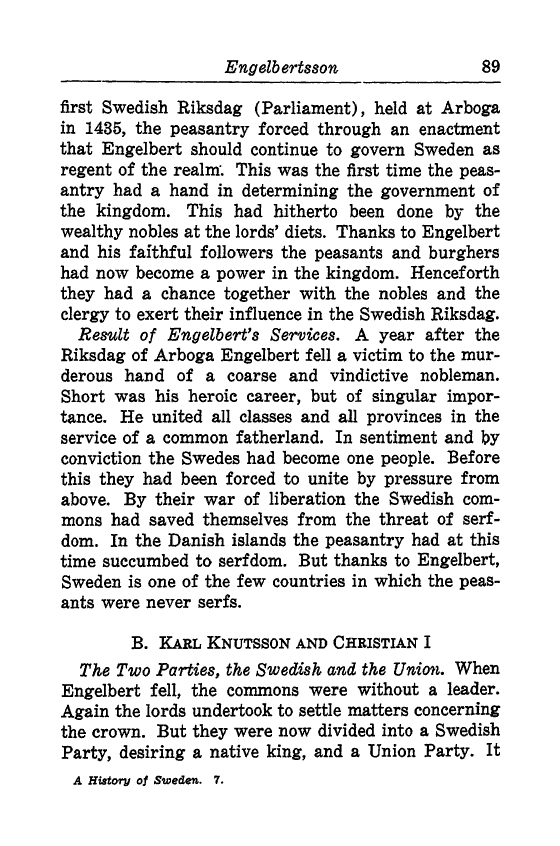
Full resolution (TIFF) - On this page / på denna sida - VI. Period of the Union, 1389–1531 - A. Margaret and Eric of Pomerania - B. Karl Knutsson and Christian I

<< prev. page << föreg. sida << >> nästa sida >> next page >>
Below is the raw OCR text
from the above scanned image.
Do you see an error? Proofread the page now!
Här nedan syns maskintolkade texten från faksimilbilden ovan.
Ser du något fel? Korrekturläs sidan nu!
This page has never been proofread. / Denna sida har aldrig korrekturlästs.
Engelbertsson 89
first Swedish Riksdag (Parliament), held at Arboga
in 1435, the peasantry forced through an enactment
that Engelbert should continue to govern Sweden as
regent of the realm’. This was the first time the peas-
antry had a hand in determining the government of
the kingdom. This had hitherto been done by the
wealthy nobles at the lords’ diets. Thanks to Engelbert
and his faithful followers the peasants and burghers
had now become a power in the kingdom. Henceforth
they had a chance together with the nobles and the
clergy to exert their influence in the Swedish Riksdag.
Result of Engelbert
9
s Services. A year after the
Riksdag of Arboga Engelbert fell a victim to the mur-
derous hand of a coarse and vindictive nobleman.
Short was his heroic career, but of singular impor-
tance. He united all classes and all provinces in the
service of a common fatherland. In sentiment and by
conviction the Swedes had become one people. Before
this they had been forced to unite by pressure from
above. By their war of liberation the Swedish com-
mons had saved themselves from the threat of serf-
dom. In the Danish islands the peasantry had at this
time succumbed to serfdom. But thanks to Engelbert,
Sweden is one of the few countries in which the peas-
ants were never serfs.
B. KARL KNUTSSON AND CHRISTIAN I
The Two Parties, the Swedish and the Union. When
Engelbert fell, the commons were without a leader.
Again the lords undertook to settle matters concerning
the crown. But they were now divided into a Swedish
Party, desiring a native king, and a Union Party. It
A History of Sweden. 7.
<< prev. page << föreg. sida << >> nästa sida >> next page >>